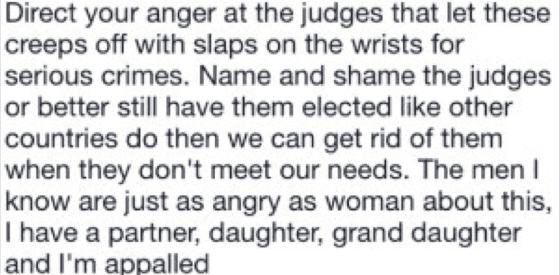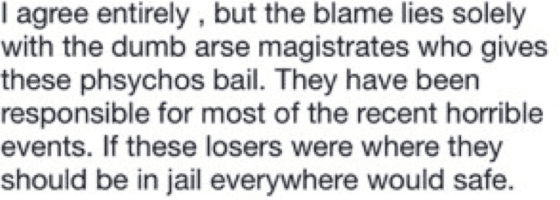The tragic and senseless murder of 17 year-old Masa Vukotic in Melbourne was met with a broad range of responses. Most controversially was that of Victorian Homicide Squad Inspector, Mick Hughes, who suggested to the media that “people, particularly females, they shouldn’t be alone in parks – I’m sorry to say that, that is the case.”
This caused a stir among people who believe that the actions of a woman going about her day-to-day business should never be considered to be a contributing factor to a man’s violent action.
Victim-shaming is a well publicised concept following the murder of Jill Meagher in 2012, the Isla Vista college murders in 2014, and perhaps most widely, by the Slut Walk movement. Basically, it focuses on a victim’s actions in the lead up to being the target of a crime, rather than asking why the perpetrator committed that crime. This can include shaming women for drinking too much, or wearing certain outfits. None of these things justify women being targets.
Some people still manage to find ways to skew the reality of the situation, which is: men kill women. Yes, men are victims of violence too. But men are overwhelmingly the perpetrators of violence, particularly where women are the victims.
In observation of the online reaction to this tragedy, the following seven responses represent attitudes that are preventing meaningful action against these patterns of violence.
Guys – please – take note.
1. The #notallmen
Perhaps the most dangerously common attitude, is one which dismisses the act of a violent offender as one that is so abhorrent that it could not be representative of an entire gender.
To say ‘but not all men commit violent crimes’ attempts to remove the possibility that any man could, in the eyes of women, potentially commit such an act against them.
By condemning only the most extreme cases of gender violence – as we saw two weeks ago – we fail to acknowledge the link between male entitlement and the violent ends it can lead to.
2. The mansplainer
This response is typified by the Homicide Squad Inspector himself. No man can truly understand the world in which women live, let alone tell them about it – and I’m not going to even attempt to do that here.
A man giving advice to women on how they should conduct themselves to avoid harm is not only condescending, but assumes that women aren’t capable of critically assessing the dangers they face on a daily basis themselves.
3. The reality-checker
The classic argument that ‘we don’t live in an ideal world, but everybody needs to take precautions’ is, to a degree, valid. But it doesn’t consider the many precautions women already take to try and protect themselves.
This tragedy occurred to a young woman going for a run in broad daylight – an activity practised by many, and considered safe and healthy in this country.
Suggesting women should exercise with only one earphone in, or with a buddy at all times encourages the notion that women must continue to restrict their lives in order to avoid being murdered.
4. The brother/father/husband
The ultimate authority on women’s issue – the man that knows a woman. The ‘I have a wife/daughter/mother so I have a valid opinion’ argument is problematic in two ways:
First, the notion that your opinion matters because you think you know how women operate is completely invalid – because you’re still NOT A WOMAN.
Secondly, prefacing an argument with this sense of authority demonstrates that the only reason you care is because women’s issues impact upon the women who impact upon you. Meaning, you’re not in this for the betterment of women, you’re in it for yourself.
5. The sane and sober
Describing violent men as ‘psychopathic’, ‘insane’, or as ‘drug addicts’ promotes misconceptions about the realities of violence against women. Anybody can commit a violent crime, and the overwhelming majority violence against women actually occurs behind closed doors.
The violent murder of Jill Meagher generated huge awareness for violence, but the focus remained on the ‘monster’, the man in the dark alley, preying on women – not on the much more common abusive partner, father or friend.
This piece about the danger of the ‘monster myth’ by Tom Meagher, husband of rape-murder victim Jill, is essential reading.
Labelling violent behaviour as ‘crazy’ or putting it down to drugs and alcohol also marginalises the struggles of those living with mental illness or addiction. People who are already largely stigmatised and need the support of their communities.
6. The system-fixer
There are well-documented issues with the parole system, many of which have been acknowledged by government. These criticisms are valid to the extent that the law fails to ensure adequate measures to prevent reoffending.
However they are often targeting the wrong systems of law, namely judges and magistrates, who are required to apply the law, not arbitrary ideas of what is ‘right’.
Criticisms are better directed at those that make the laws relating to parole and sentencing – state and federal governments.
7. The anti-feminist
This category doesn’t exactly fit with the others, but is worth a mention. There’s no doubt that in some circles, feminism is still a dirty word. That’s another battle to fight entirely.
That any man can come out and respond to challenges of the status quo with comments that are aggressive and hateful, almost defending a killer’s actions, is unfathomable.
Shutting down any discussion about a girl being killed by a man, on the basis that the comments are being made by someone who believes in gender equality, highlights the endemic misogyny in our society.
And for those who write off arguments about the ways women continue to be victimised in our society based on their gender as ‘feminism at its finest’, well, they are technically correct.
This is what feminism, for a lot of people, is all about. And those sympathetic of the feminist cause should be proud.
If it were so easy to change the minds of these people who clearly just do not get it, there would be much less need for these conversations.
Are you free on April 13? We are officially launching Hinton by screening The Representation Project’s new film, ‘The Mask You Live In’. AFL champion Chris Judd and writer/comedian Corinne Grant are among our special guest who will be take part in a panel discussion following the screening.
We would love to see you there! More information here.









